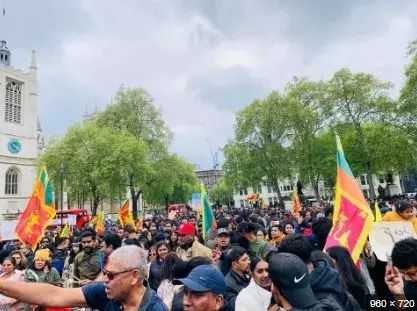Sri Lankan’s Protest Over Taxation
Between The Devil & The Deep Sea

The Sri Lankan capital city of Colombo came to a standstill on Wednesday as organisations of workers and professionals were on strike to express opposition to the new personal income tax announced by the government.
While the agitators said that the taxes imposed an unbearable burden on them at a time when prices had skyrocketed (66% inflation), the government maintained that it desperately needed a hike in taxes to shore up its dwindling finances. Due to financial mismanagement, freebies doled out for decades, years of tax concessions, non-collection of taxes and loss-making public sector institutions, the government’s coffers are at rock-bottom.
According to the World Bank, tax revenue is only 7.7% of the GDP in Sri Lanka, while in India it is 12%.
In view of the mounting discontent, the Ranil Wickremesinghe government met the agitated unions and professional associations and told them that the new Personal Income Tax was only a short-term economic development strategy and that it would be open to further discussions and amendments. The government pointed to the parlous state of its finances and said that Sri Lanka had a very low percentage of personal income tax compared to other Asian countries. But clearly these pleas fell on deaf ears.
In the Budget for 2003, presented in November 2022, the government aimed at increasing tax revenue by 69% to LKR 3,130 billion in 2023 from LKR 1,852 billion in 2022. It aimed to bring down the budget deficit to 7.9% in 2023 from 9.8 % in 2022. President Wickremesinghe, who is also Finance Minister, said that it was important to bring high income earners into the tax net.
On the restructuring of loss-making State Owned Enterprises (S.O.E.), the President said that he had identified five SOEs but did not give a timeframe or a framework for the restructuring. The I.M.F., which is considering an Extended Fund Facility (E.F.F.) of US$ 2.9 billion for Sri Lanka, has stated S.O.E.restructuring as a condition for the bailout.
The expectation that there would be a cut in government expenditure, a way of saving money, was also belied. Instead of working on these issues, the government raised the prices of electricity, fuel and cooking gas to record highs when income levels had fallen precipitously due to the pandemic-time lockdowns and the subsequent financial crisis due to mismanagement over decades. Sri Lanka had defaulted on April 12, 2022 when its foreign debt was U$ 50 billion.
According to www.publicfinance.lk Sri Lanka experienced a significant change in its tax system for the year 2020. These changes led to a considerable shrinkage in the tax base.
The number of employees registered to pay monthly tax on their incomes came down by 97% from 2019 to 2022, which was mainly due to the replacement of the mandatory Pay-As-You-Earn (P.A.Y.E.) tax system with an optional Advanced Personal Income Tax (A.P.I.T.) system and an increase in the tax-free threshold by six times.
The website further said: “There was also a change in the system to pay taxes on interest income. It was initially done via withholding tax, which was replaced with Advanced Income Tax for 2020, this led to a reduction in agents registered to pay taxes on interest income by 63% for the same time period. Lastly, by increasing the VAT registration threshold from LKR 12 million per annum to LKR 300 million per annum, the number of companies registered for VAT fell by 69% from 2019 to 2022.”
Even as the I.M.F. is working on an Extended Fund Facility (E.F.F.) of US$ 2.9 Billion, it has put a number of conditions. Sri Lanka has to restructure its debt through negotiations with its bilateral, institutional, and private creditors in an equitable manner. This process has been on and the timeframe is anybody’s guess.
So far, India and the Paris Club of creditors have announced that they would offer financial assurances as required by the I.M.F. But China, the largest bilateral lender, is yet to do so. All that China has done so far is to offer a two-year moratorium on the payment of the principal and interest for loans taken from its EXIM bank in 2022-2023. This is inadequate from the I.M.F.’s point of view.
Other important things that the I.M.F. wants Sri Lanka to do: (1) reduce the ratio of public debt to G.D.P. to below 95% by 2032; (2) bringing the annual gross financing needs to bring 3% of G.D.P. on an average between 2027-2032; (3) scaling down the annual foreign currency debt service to below 4. 5 % of G.D.P. every year between 2027-2032; (4) closing its external financing gap.
While Sri Lanka has to meet this tall order, the public, including the very poor as well as the professional classes, are in a sullen mood. While the poor are battling high prices, the professionals do not want to pay higher taxes.
On Wednesday, as Colombo was on strike, President Wickremesinghe pleaded with parliamentarians for cooperation. “Let us set aside our political agendas for the time being and put our shoulders together to rescue the country,” he said.



